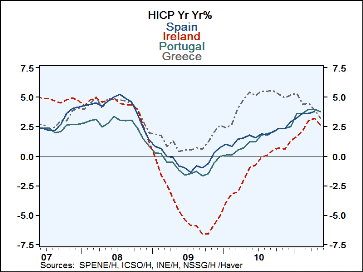 Global| Jun 10 2011
Global| Jun 10 2011Euro Area Progress Takes a Different Metric
Summary
The table in this commentary contains data for some of the early inflation reporters in the Euro Area, as does the graph. The graph is showing that the rising inflation trend is abating across all of the troubled borrowers in the [...]
 The table in this commentary contains data for some of the early inflation reporters in the Euro Area, as does the graph.
The graph is showing that the rising inflation trend is abating across all of the troubled borrowers in the table except for Spain whose May data are not yet in.
But for Spain through April the inflation picture was getting worse largely because of inflation spike in March even though
April itself brought a decline in the HICP. Greece’s profile actual show a big step down in inflation over 12 months Vs inflation
over the previous 12 months (not shown).
The table in this commentary contains data for some of the early inflation reporters in the Euro Area, as does the graph.
The graph is showing that the rising inflation trend is abating across all of the troubled borrowers in the table except for Spain whose May data are not yet in.
But for Spain through April the inflation picture was getting worse largely because of inflation spike in March even though
April itself brought a decline in the HICP. Greece’s profile actual show a big step down in inflation over 12 months Vs inflation
over the previous 12 months (not shown).
Of eight reporting nations in May five show monthly inflation drops. Only Italy, the Netherlands and Spain show steadily rising inflation profiles in the table on their sequential growth rates.
Still inflation rates are decelerating in 45% of the categories in three-months compared to six-months.
What we see is a picture of inflation breaking lower. Meanwhile the ECB is getting worried about inflation and has decided to send a message that jittery debt negotiations will not stay it from its inflation fighting rounds. Yet it is not clear that the ECB has any such pressing call to duty right now.
Core inflation metrics are yet in. But the evidence is that core inflation is much more subdued and that means that energy inflation is not spreading fast. The core is rising; it is up to 1.7% in April 2011 form 1.5% in March 2011. But with the headline pace having been broken it is likely that the core pace will also short circuit.
The ECB as a single mandate bank is being cautious. But too much monetary tightness in the face of all that fiscal austerity and with a rising currency and it may find it is squeezing too much too fast. Even a single mandate central bank has to take in the big picture. I think Trichet is too quick on the trigger or at on threat of pulling the trigger. I don’t know if he can cajole the debt negotiators to cut a better deal with this tactic but the tactic seems dangerous. It’s like that in a lot of places these days. Meanwhile the declining rates of inflation in the countries that are distressed borrowers, seems to confirm that their austerity is taking hold and doing some good.
| EMU early Inflation reporters | ||||||
|---|---|---|---|---|---|---|
| Monthly Annualized | Annualized | |||||
| May-11 | Apr-11 | Mar-11 | 3Mo | 6Mo | 12-Mo | |
| Belgium | 1.1% | 0.0% | 5.4% | 2.1% | 3.4% | 3.1% |
| Germany | -2.1% | 3.3% | 6.7% | 2.6% | 3.0% | 2.4% |
| Italy | 2.1% | 3.2% | 7.7% | 4.3% | 3.4% | 2.9% |
| Luxembourg | -1.5% | 1.1% | 6.7% | 2.0% | 4.7% | 3.8% |
| The Netherlands | 2.4% | 3.3% | 3.2% | 3.0% | 2.8% | 2.4% |
| Portugal | -0.8% | 2.3% | 7.7% | 3.0% | 4.8% | 3.7% |
| Spain | #N/A | -0.7% | 25.2% | 9.0% | 5.6% | 3.5% |
| Ireland | -2.2% | 1.1% | 2.3% | 0.4% | 2.5% | 1.2% |
| Greece | -1.0% | 1.0% | 11.6% | 3.7% | 2.5% | 3.1% |
| Lagged by one month | 3M-6M | 6M-12M | 12M-12MAgo | |||
| 5 Decelerating | 45.5% | 9.1% | 9.1% | |||
Robert Brusca
AuthorMore in Author Profile »Robert A. Brusca is Chief Economist of Fact and Opinion Economics, a consulting firm he founded in Manhattan. He has been an economist on Wall Street for over 25 years. He has visited central banking and large institutional clients in over 30 countries in his career as an economist. Mr. Brusca was a Divisional Research Chief at the Federal Reserve Bank of NY (Chief of the International Financial markets Division), a Fed Watcher at Irving Trust and Chief Economist at Nikko Securities International. He is widely quoted and appears in various media. Mr. Brusca holds an MA and Ph.D. in economics from Michigan State University and a BA in Economics from the University of Michigan. His research pursues his strong interests in non aligned policy economics as well as international economics. FAO Economics’ research targets investors to assist them in making better investment decisions in stocks, bonds and in a variety of international assets. The company does not manage money and has no conflicts in giving economic advice.






